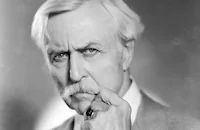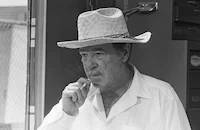General Spanky

Brief Synopsis
Cast & Crew
Fred Newmeyer
Spanky Mcfarland
Phillips Holmes
Ralph Morgan
Irving Pichel
Rosina Lawrence
Film Details
Technical Specs

Synopsis
Just before the start of the Civil War, six-year-old bootblack Spanky has to jump off a Mississippi River boat when his new little pal Buckwheat paints some of the passengers' shoes white to drum up business. Buckwheat, who is afraid he'll be shot as a runaway slave, soon follows, and the boys make their way to shore, then look food. Marshall Vallent, a kind man who had befriended Spanky on the boat, is against any war with the North, and is called a traitor by his friends. When Marshall encounters Spanky on shore, the boy convinces him that even though he is against war, he must stand by his friends. In gratitude for Spanky's advice, Marshall invites the boy to live with him and takes in Buckwheat as well, when he finds the hungry boy hiding under the dinner table. Some time later, the war between the North and South begins and Marshall, who has become a confederate officer, leaves Spanky in charge at home, and asks him to take special care of Marshall's sweetheart Louella, the daughter of elderly Colonel Blanchard. While the men are at war, Spanky, Buckwheat and their friend Alfalfa join other children in building a fort to protect the town. When some Yankee soldiers think that the fort is real, they fire upon it and make fools of themselves in front of their general when he arrives in time to see the "rebels" surrender. The bemused general commends the little soldiers for their bravery and calls Spanky "General Spanky." He then leaves the town in the care of Captain Simmons, who forcibly makes his headquarters in the Blanchard house. Meanwhile, Marshall has been wounded nearby and drags himself back to town where he is found by Spanky and his dog. They hide Marshall in their secret cave and summon Louella to help, but a suspicious Simmons follows Buckwheat to the cave and arrests Marshall. At a court-martial, Marshall is convicted as a spy and condemned to death, even though some members of the court think that the evidence is flimsy. When Marshall is sentenced to be shot, Spanky gets the idea to visit the Yankee general and ask for his help, as one general to another. After hearing Spanky's story, the Yankee general accompanies Spanky back to town, re-opens Marshall's court-martial, apologizes to Colonel Blanchard for Simmons' behavior, then has Simmons arrested. The general then arranges for Marshall to be included in an exchange of Northern and Southern prisoners of war if Marshall promises to return to civilian life. Finally, as a reward for his actions, the Yankee general is given an honorable induction into the children's army.

Cast
Spanky Mcfarland

Phillips Holmes

Ralph Morgan

Irving Pichel

Rosina Lawrence
Billie "buckwheat" Thomas

Carl "alfalfa" Switzer

Hobart Bosworth
Robert Middlemass
James Burtis

Louise Beavers

William Best
Eugene "porky" Lee
Harold Switzer
John Collum
Dickey Deneut
Flayette Roberts
Rex Haddon Downing
Jerry Tucker
Percy Mcportland
Jesse Graves
Barney Carr
Buddy Roosevelt
Dick Winslow
Carl Voss
Walter Gregory
Jack Dougherty
Henry Hall
Frank Larue
Jack Clisby
Larry Soule
Nick Copeland
Nick Prather
Jeffrey Sayre
Dave Pepper
Richard Neill
Harry Strang
Bud Geary
Freida Shaw's Etudes
Elk Chanters
Crew
Richard Flournoy
John Guedel
Marvin Hatley
Art Lloyd
Walter Lundin
Elmer Raguse
William Randall
Hal Roach
Arthur I. Royce
Roy Seawright
Ray Snyder
W. L. Stevens
S. S. Van Keuren
Hal Yates

Photo Collections
Videos
Movie Clip


Film Details
Technical Specs

Award Nominations
Best Sound
Articles
General Spanky
Not only was the film the only feature length showcase for Our Gang, it was also the only production with a period setting, that of the Civil War. The film came on the heels of the Shirley Temple vehicles The Littlest Rebel and The Little Colonel (both 1935), and hoped to capitalize on the then-popular Confederate-styled theme (in fact, the working title of the movie was Colonel Spanky). The film actually borrowed Civil War stock footage from Buster Keaton's The General (1927) and the D.W. Griffith film Abraham Lincoln (1930) for many of its scenes.
General Spanky was co-directed by Gordon Douglas and Fred C. Newmeyer; it was the first full length film for Douglas, who had just helmed what would be a 1937 Oscar winner for Best Short Subject - an Our Gang twin-reel offering entitled Bored of Education (1936). Gordon would go on to direct such films as the sci-fi classic Them! (1954) and the Rat Pack fave Robin and the 7 Hoods (1964). Newmeyer was known more for his direction of several Harold Lloyd shorts, but in an ironic twist, he had actually directed the original Our Gang pilot which was scrapped and re-shot with another director.
General Spanky employed the talents of many: Our Gang regulars Billie "Buckwheat" Thomas and Carl "Alfalfa" Switzer stepped into their famous roles to join the star of the flick, George "Spanky" McFarland. Dapper thirties leading man Phillips Holmes and prolific character actor Irving Pichel played feature roles, as did Ralph Morgan, the brother of Frank Wizard of Oz Morgan. Perhaps the most interesting aspects of the casting were the supporting roles played by two early pioneers of black film acting, Willie Best and Louise Beavers. Best, derogatorily nicknamed "Sleep n' Eat," was a regular fixture in many Charlie Chan films as the character "Chattanooga Brown." Beavers had made her film debut in Uncle Tom's Cabin (1927), but her masterpiece is widely regarded as Imitation of Life (1934). Starring alongside Claudette Colbert, Beavers wowed audiences with a breakthrough performance during a time when blacks were often portrayed in a racist and stereotypical light. Other bit players of note include Slim Whitaker, the prolific B-western actor, and Ham Kinsey, a.k.a. Stan Laurel's stand-in.
General Spanky was a family affair of sorts: Hal's brother, Jack Roach, scouted the locations for the water scenes, settling on the Sacramento River as a stand-in for the mighty Mississippi. He also chartered an old steamboat, The Cherokee, to help capture an authentic feel for the deep South. Musical backgrounds in the film were provided by the Elk Chanters, a group affiliated with a local Los Angeles Elks Club. Although falling short of its expectations, the film did pick up a Best Sound Oscar nomination for Elmer Raguse, the head of sound at Hal Roach Studios. You may notice, however, that Raguse's name was inadvertently omitted from the credits!
General Spanky was intended to mark the end of the Our Gang shorts and be the first of many feature length films, but due to its muted success, Hal Roach returned to the shorter format and once again found success on screen, and later on television, with his Little Rascals.
Producer: Hal Roach
Director: Gordon M. Douglas, Fred C. Newmeyer
Screenplay: Richard Flournoy, John Guedel, Hal Yates, Carl Harbaugh
Cinematography: Art Lloyd, Walter Lundin
Editing: Ray Snyder
Music: Marvin Hatley
Cast: George "Spanky" McFarland (Spanky), Carl 'Alfalfa' Switzer (Alfalfa), Billie "Buckwheat" Thomas (Buckwheat), Phillips Holmes (Marshall Valiant), Ralph Morgan (Yankee General), Irving Pichel (Simmons), Rosina Lawrence (Louelia), Louise Beavers (Mammy Cornelia), Willie Best (Henry), Hobart Bosworth (Colonel Blanchard).
BW-72m.
by Eleanor Quin

General Spanky
Quotes
Trivia
Notes
The working title of this film was Colonel Spanky. Although Elmer A. Raguse, head of the sound department at Hal Roach Studies, was nominated for an Academy Award for Best Sound for this picture, only William Randall was credited onscreen. According to a news item in Hollywood Reporter on May 11, 1936, co-director Fred Newmeyer was working with writer Richard Flournoy on the script, however, the extent of Newmeyer's contribution to the final script has not been determined. Portions of the film were shot on location on the Sacramento River, CA. This was the only "Our Gang" feature film and the only picture the characters made with an historical setting. General Spany was also the first feature film directed by co-director Gordon Douglas. According to a Hollywood Reporter news item, The Elk Chanters, a group that provided some musical backgrounds for the films, were affiliated with local Los Angeles Lodge 99 and were Elks Club national champions. Modern sources include the following additional cast members: Von the Dog, Hooper Atchley, Karl Hackett, Ernie Alexander, Jack Hill, Ham Kinsey, Jack Cooper, Slim Whittaker, Harry Bernard, Alex Finlayson, Richard Neill and Portia Lanning.

Miscellaneous Notes
Released in United States 1936
Released in United States 1936














